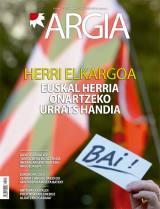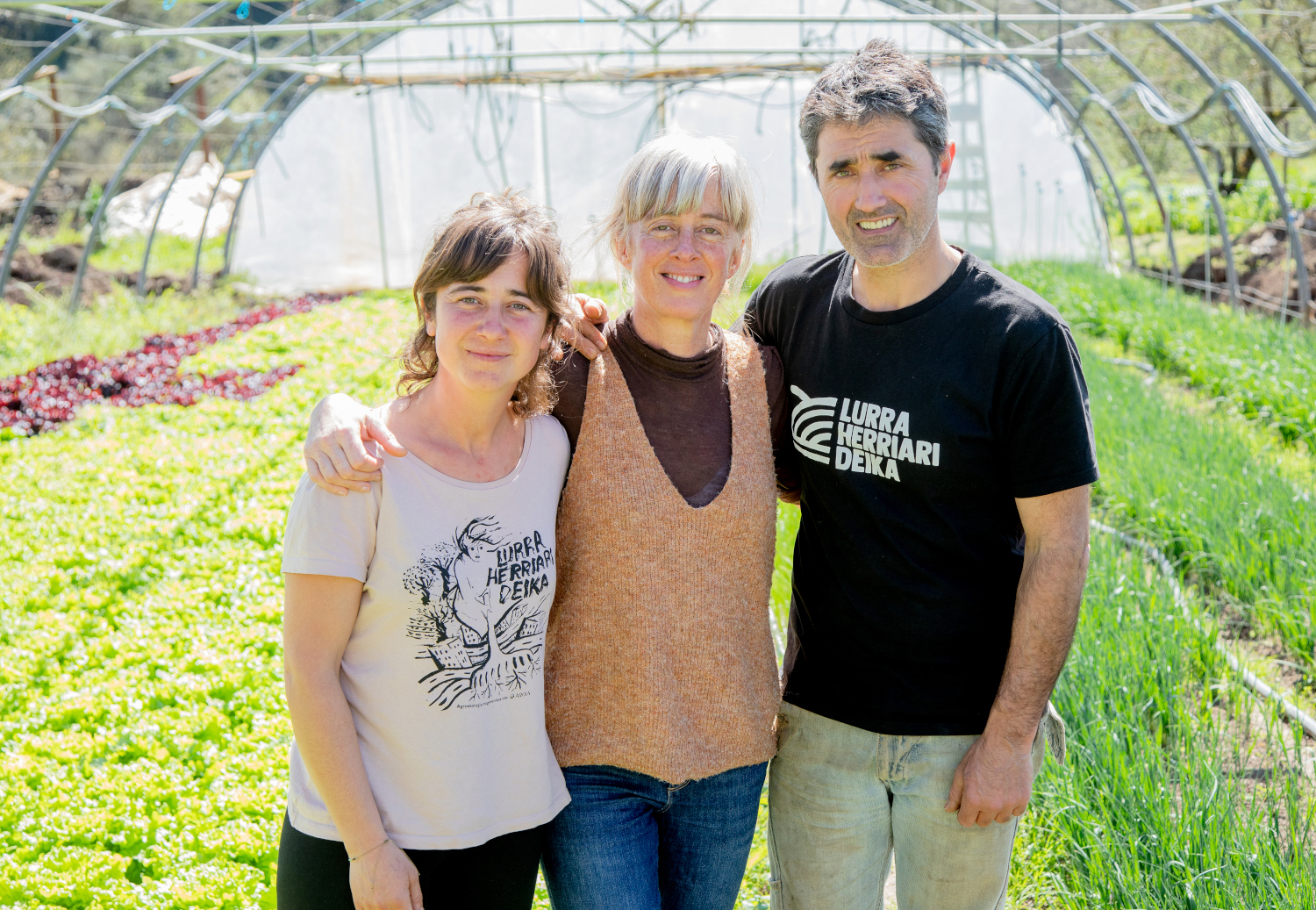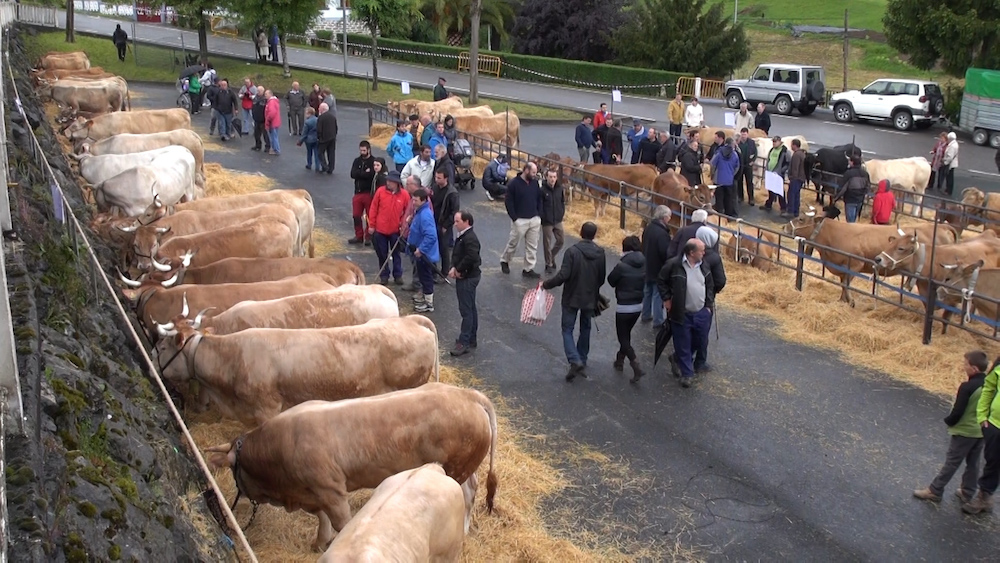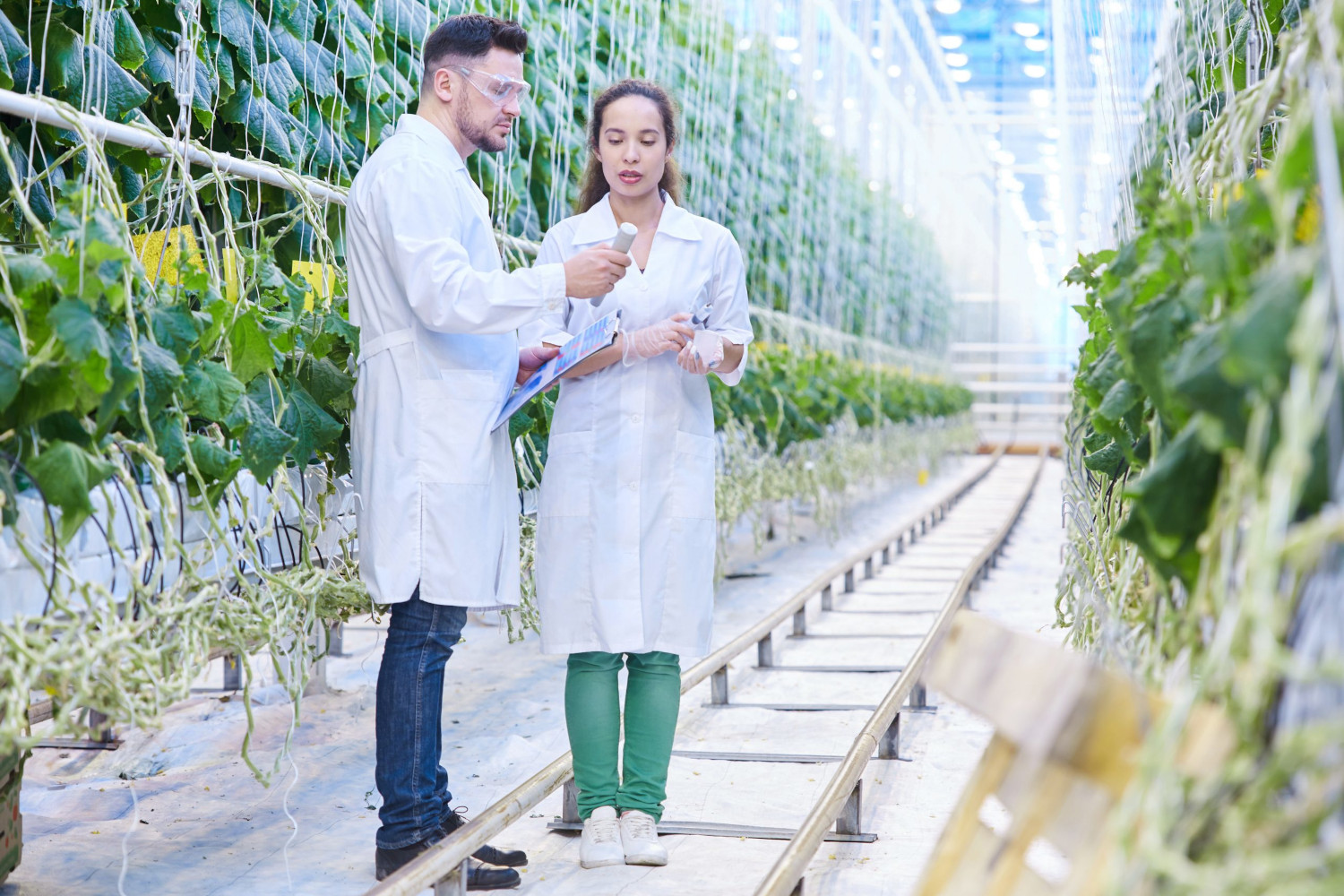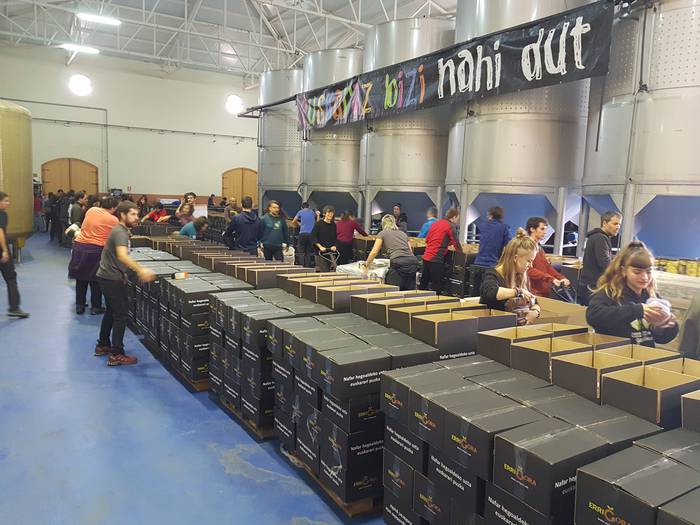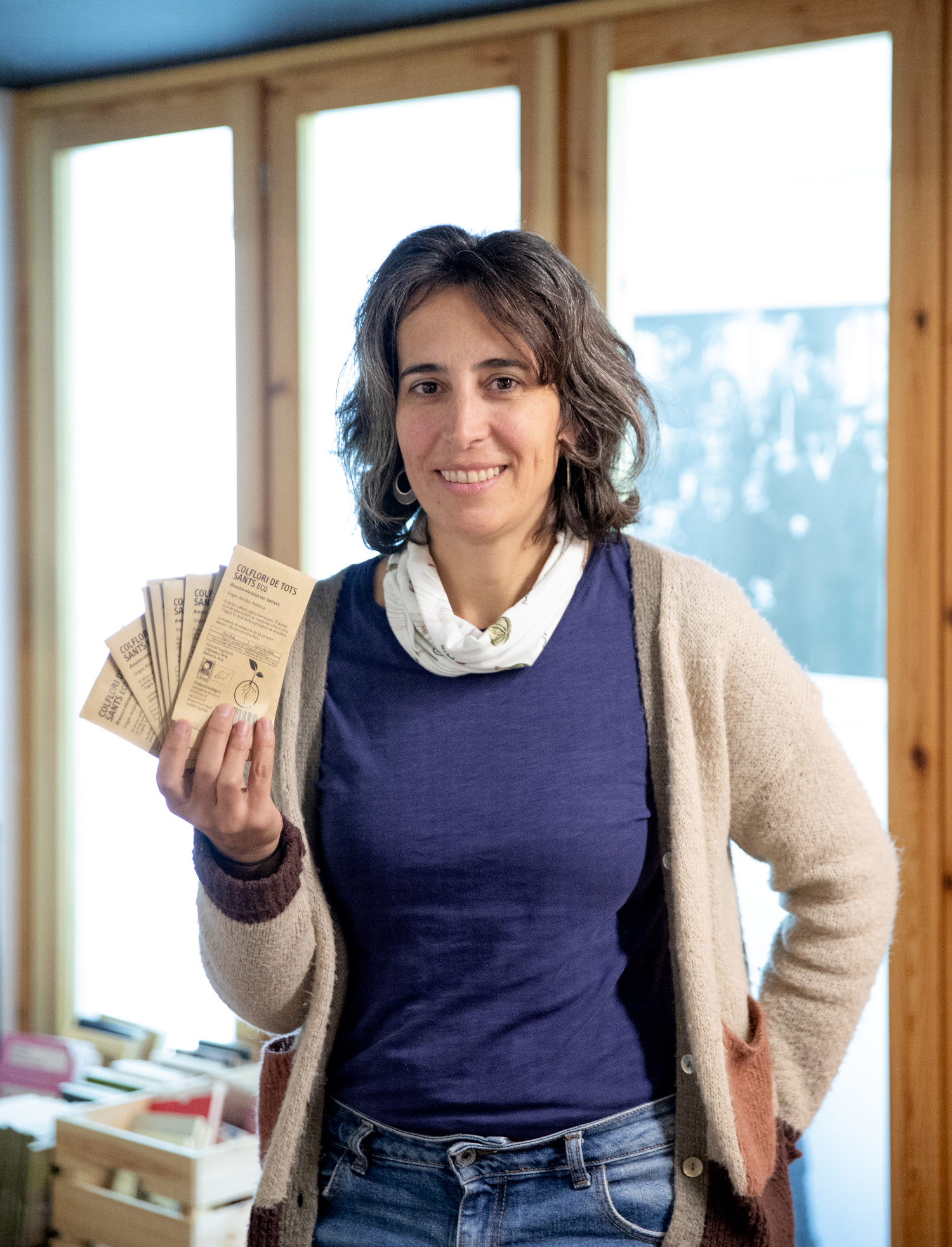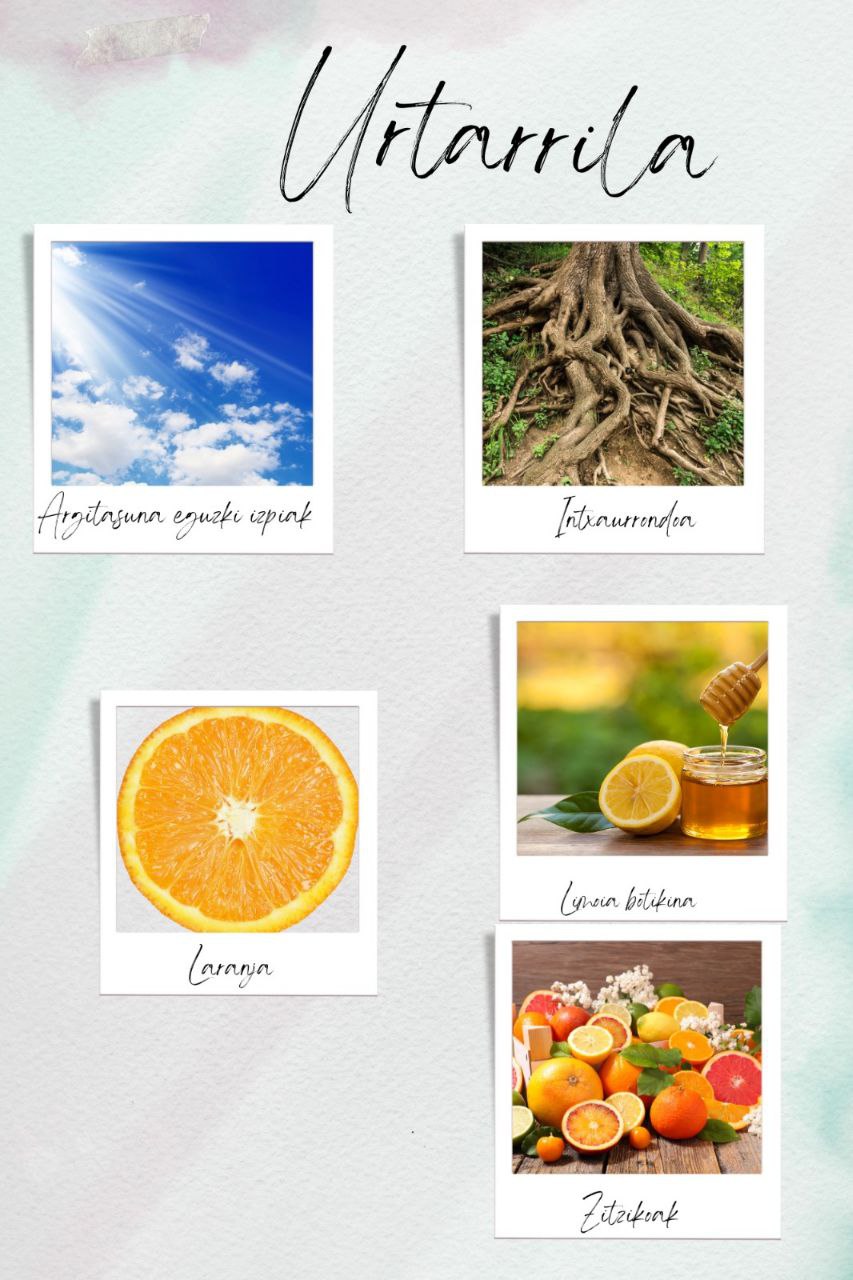"If people get excited about a tomato, how can't they feel emotion about more changes?"
- In the region of Pamplona there are two “rare” supermarkets. All the products they sell in are organic and can only be purchased by partners. And what's more "weird" is that 80 percent of the profit is for producers. The initiative, called Landare, was born 24 years ago and currently has two shops, one in the Rochapea district of Pamplona, another in Villava, and 2,600 partners. Vegetable seller David Garnatxo is the coordinator of the Landare association.
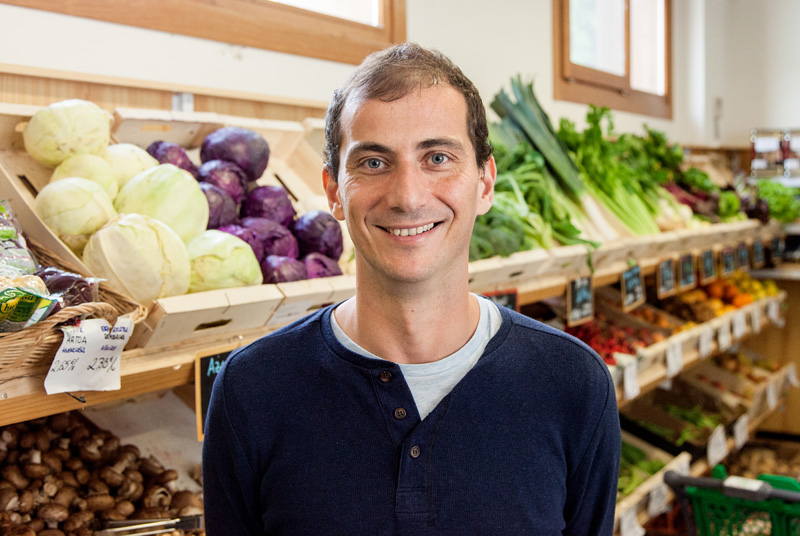
He studied law at the University of Opus. What life had that been?
The change was brutal at the ikastola San Fermín and at a model D institute. I remember that on the first day of coming to class, Professor José Zafra, known from Opus, gave us a form to fill in the form, to indicate which language we spoke, “but don’t put dialects as bable or vascuence, please.” Suddenly I felt in a strange place. But the truth is, then I had very good relationships with people who felt and thought like me in college, and many of my good friends are people I've met there. There I also met my partner.
It has also been devoted to policy.
Before I start in Landa, I've done a lot of things. At AEK, for example, I was a professor, and it was at that point that I had to teach a group of Laboral Kutxa students. I found out for them about the possibility of working there. They ran tests and got me. I was there for four years. Then I freed myself to engage in politics, to the newly created Nafarroa Bai. Shortly afterwards I participated in the creation of the Aralar group. Despite being comfortable and learning a lot, I soon realized it wasn't the place I wanted to be, so I left everything. I went to India, and after five months I went back and started doing consultancy work here and there. So I met Landare. It was a partnership that was growing very rapidly and that needed deep intervention from the business point of view. On the one hand, the relationship between the workers and Lander had to be arranged, and on the other hand, put into professional parameters what was offered to the client and its internal functioning. We did it, and once it was over, in 2008, I was offered to continue here. Since then I've been here, working very willingly.
What is the biggest contribution of Planta?
Given the injustice that is observed anywhere, Planta proposes a new model: that the responsibility for the distribution of food is not in the hands of a person or a group of shareholders, but in a group of people who want to make the distribution. That is our greatest philosophical and practical contribution.
How has this partnership been created and developed?
Founded in 1992. There are citizens who wanted to eat ecologically, but finding food was not easy, and also the prices were very high. Today there is no lack of products, the supply is assured, but now the reflection is another: how to achieve cheaper products, ensuring that producers receive a fair price.
Partners have common values. We are learning, but we are not entrepreneurs. We are a partnership. This formula serves us to match the rights and obligations of all people, and that is our essence. At the time of decision-making, the opinion of the person who bought a euro a year or who spent a thousand euros is the same. That is very important. At the bottom, that's the best that Planta offers. It's not a strategic issue, it's a matter of our thinking, and that philosophy allows for another way of doing things.
Now you are in a process.
We started a year and a half ago. We have chosen to allocate among all the tasks to be carried out. To do so, we are modifying the decision-making and power spaces of Planta. We have created a coordination table for decision-making and are learning to share responsibilities among all. It's very difficult, but it's very enriching. Landa has had four workers for eight years who, in total, had two full days. Now there are 25 full days. Growth has been very important in the working group, in the number of partners and in billing. We have a turnover of EUR 3 million per year. Here the lowest wage is 1,100 euros and the highest of 1,500, with six and a half weeks of vacation.
In Landa we understand that we need others to change things. Coexistence enriches us. Here the vegetarians, the animalists, the vegans, the dining rooms of everything, we live at ease together. If people get excited about a tomato, how can't they feel impacted by more changes? We are very humble, because at the end of the day we are greengers. I am very proud of this trade.
How does the food market work?
Large shopping malls spread very aggressively. They offer very low prices at first and they succeed in breaking the market of a city or region. They impose other systems for closing and distributing small businesses, reinvesting very little in this place. This is how deserts are born.
From the 1970s on, food moved from one place to another around the world. That's not ecological. The world is going to do it if we don't stop it. I know it's very difficult, but there's no other way. Formulas must be created to look for alternatives to food distribution in cities and towns.
In Europe, producers are getting less and less, and if they continue to do so, they will disappear. 40 years ago, we spent 30 percent of our food revenue. Today, despite earning more money, we only spend 15% of food. On the other hand, 50% of the food produced in the world is poured out. One in seven people is hungry.
Work follows the interests of money and that is neither healthy nor logical. In addition, the government has always sought to help producers as much as possible, which has created a great problem: the main objective of agriculture and livestock farming is not to feed people, but to obtain subsidies and profits.
We have to think beyond personal interests…
Faced with the idea that “whoever can save himself”, we will consume and share with other people around the world shoes, food, clothing, and many things will change. You're not going to create a new human, but it's going to change for the better, and that's going to generate illusion, emotion and commitment. That's what we feel in Landa. People stay with the Plant and that brings us a lot of benefits. Here we are 2,600 families, and no one steals, for example. A new model can be completed by joining experiences like this.
Some people can't choose what they eat.
In many places this is the case, and here too, in recent years, people have become extremely impoverished. In Euskal Herria we might not perceive it as much, but in the Spanish state or in Greece what is happening is impressive. What happened in Greece gives me a real fear: A State has wanted to deal with this system and has been unable to do anything. Even though he won the elections and won a referendum, he was unable to do anything, because those who send him do not leave him. Hope has died.
Faced with this, the only avenue for resistance and the proposal is to create alternatives and move from discourse to action. We don't have to fear that we're hitting each other.
Do people need to be empowered?
Yes. It's hard for people to make decisions. Learning that is what costs us the most. The level of education and culture is higher than ever and if we do not do it now, when will we do it when we are impoverished? Getting out of the comfort zones and putting it at risk because what we believe is not real comfort. If we have to be well at the expense of others, it is not a real comfort.
Are people’s health also being affected by the food delivery system?
In our society, we have nutritional losses despite eating three times a day. Many people are sick from eating poor food prepared for a long time. This problem is based on the dichotomy between the person or performance, favoring the performance of those responsible for the distribution of food. It is not a democratic system, because it is in the hands of very few people. Few but very large companies.
Similar things are being eaten around the world, because it is big companies that decide what we have to eat. The same applies, for example, to clothing. You lose diversity and you look at the economy from a single angle. Education is also like that. We prepare people to integrate into these circles.
FAO, the Food and Agriculture Organization of the United Nations, estimates that in the last century 75 per cent of the diversity of world agriculture has been lost. The same rice is produced in India, Argentina or Arguedas.
More and more groups are driving responsible consumption. Are people here especially active?
In Euskal Herria, we have passed very quickly from rural society to citizenship, and also very crowded. People have some references and they don't find them in their environment. In addition, there are some ways of doing things, like auzolan, that lead us to do things with others. We are now working with other associations to lower prices and establish fair relationships. 70% of what we sell comes from outside, from Spain and from all over Europe. We have started working with the Otsokop cooperative in Baiona and the Labore de Orereta group. The aim is to sell as cheaply as possible and, furthermore, to let consumers know where everything comes from and how much the producer has earned.
The problem today is that the ecological market is copying the scheme of the conventional market. A few years ago, we sold bread from Amaranto, for example. That bread was made in Burlada, we took it to Belgium and then brought it from there. They told us they do this because the brand has to control the entire distribution process. Now, of course, we don't sell that bread.
In addition to buying food, what do partners do?
When Landare was born, she was very poor and needed a job in Auzolan in order to be able to do all the work. Now it has remained as a mark of identity and all members and partners take a two-hour day in Landa: talks, workshops, courses, knowledge exchange sessions (looking at the stars, yoga, gymnastics, bicycle repair session, food sessions…), everything is done for free and is of great help to foster other relationships.
The government of change has been one year old in Navarre. What is your assessment?
I am very happy with the change. In our sector, some things have started to be noticed and others are not yet. Anyway, what I'm afraid of is that the debate is just about Euskera. The only thing that needs to be changed is that Euskera is the language. It is time to propose another model of society, including the Basque. That's where they're going very slowly.
We need courage. On the subject of children's schools, for example, it is important that you can choose a school in Basque, but you also have to bear in mind that public schools are very expensive and there are also few places. The City Council of Pamplona is doing a very orderly job, but on this subject, for example, I would ask you to look further. We have to turn around this Navarre which has been built against the majority, placing the vasquity in the common place.
Abokatua, ekologista, politikan aritua eta gaur egun barazki saltzailea eta Landare elkartearen koordinatzailea. Produktu ekologikoen prezioak merkatzen saiatzen dira, aldi berean ekoizle eta kontsumitzaileen artean harreman justuagoak eraikitzen.
“Vandana Shiva ekofeministak dio: ‘Inork iraultza egin nahi badu, hiru aukera ditu egunero: gosaltzerakoan, bazkaltzerakoan eta afaltzerakoan’. Bada, goazen mundua aldatzera. Apaltasun osoz, goazen gure inguruan hori egitera. Horrela aldatuko dira harremanak eta ekonomia”.
Harreman hori normala da. Hemen ez da inor behartzen ikastera, noski, baina egia da normaltasun osoz bizi dela euskararen gaia. Aniztasun ideologiko handia dago gure bazkideen artean. D eredura eta Opuseko ikastetxeetara haurrak eramaten dituzten familiak badira, eta ulertzen dugu erdara eta euskara gure lanbiderako behar direla jakin. Erakundeek ez dute batere laguntzen. Guk nahi genuke etiketa guztiak euskaraz eta erdaraz egotea, adibidez, eta ez dago organismo publikorik horretan laguntzen duenik. Behin horretarako laguntza eman zigun Hernaniko Udalak. Hornitzaileei bi hizkuntzetan etiketatzea eskatzen diegu, horretan proaktiboak gara. Ez da soilik filosofia kontua, gehiago salduko dutelako baizik. Euskaraz dakienak hobeki ulertuko du eta ez dakienak eskertuko du aniztasunaren alde lan egitea.
Bizkaigane elkarteak elikadura burujabetzan oinarritutako proiektua du Errigoitin (Bizkaia), 1983tik. Instalazioak dauden lur eremutik aterarazi nahi du lur jabeak elkartea. EHNE Bizkaia sindikatuak adierazi duenez, instalazioek lege eta administrazio eskakizun guztiak betetzen... [+]
Martxoaren 10etik 26ra izango da udaberriko kanpaina. 'Beste modura, denona de onura' lelopean arituko dira gertuko ekoizpena, banaketa eta kontsumoa babestu eta sustatzeko, ager zonaldean euskara hauspotzen duten bitartean. Apirila amaieratik aurrera jasoko dira... [+]
Euskal Herriko bi muturretatik datoz Itziar (Bilbo, 1982) eta Ekaitz (Erriberri, 2002), sortzen ari den Burujabetzaren Aldeko Mugimenduaren berri ematera. Euskal Herrian diren burujabetza prozesu ugariak arloz arlo bultzatu eta indartu nahi ditu BAMek. Lan horretan hasteko,... [+]
Emakume bakoitzaren errelatotik abiatuta, lurrari eta elikadurari buruzko jakituria kolektibizatu eta sukaldeko iruditegia irauli nahi ditu Ziminttere proiektuak, mahai baten bueltan, sukaldean bertan eta elikagaiak eskutan darabiltzaten bitartean.









